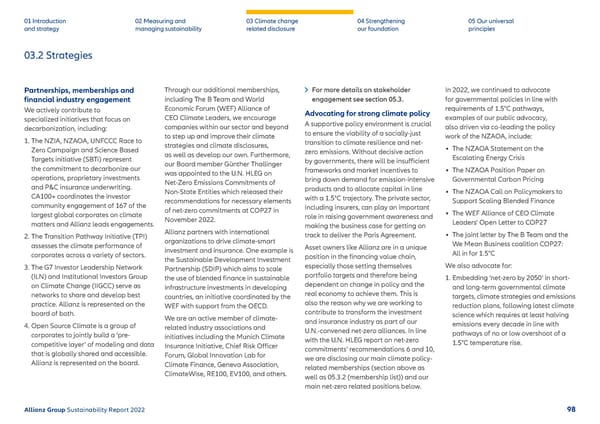01 Introduction and strategy 02 Measuring and managing sustainability 03 Climate change related disclosure 04 Strengthening our foundation 05 Our universal principles 03.2 Strategies Partnerships, memberships and financial industry engagement We actively contribute to specialized initiatives that focus on decarbonization, including: 1. The NZIA, NZAOA, UNFCCC Race to Zero Campaign and Science Based Targets initiative (SBTi) represent the commitment to decarbonize our operations, proprietary investments and P&C insurance underwriting. CA100+ coordinates the investor community engagement of 167 of the largest global corporates on climate matters and Allianz leads engagements. 2. The Transition Pathway Initiative (TPI) assesses the climate performance of corporates across a variety of sectors. 3. The G7 Investor Leadership Network (ILN) and Institutional Investors Group on Climate Change (IIGCC) serve as networks to share and develop best practice. Allianz is represented on the board of both. 4. Open Source Climate is a group of corporates to jointly build a ‘pre- competitive layer’ of modeling and data that is globally shared and accessible. Allianz is represented on the board. Through our additional memberships, including The B Team and World Economic Forum (WEF) Alliance of CEO Climate Leaders, we encourage companies within our sector and beyond to step up and improve their climate strategies and climate disclosures, as well as develop our own. Furthermore, our Board member Günther Thallinger was appointed to the U.N. HLEG on Net-Zero Emissions Commitments of Non-State Entities which released their recommendations for necessary elements of net-zero commitments at COP27 in November 2022. Allianz partners with international organizations to drive climate-smart investment and insurance. One example is the Sustainable Development Investment Partnership (SDIP) which aims to scale the use of blended finance in sustainable infrastructure investments in developing countries, an initiative coordinated by the WEF with support from the OECD. We are an active member of climate- related industry associations and initiatives including the Munich Climate Insurance Initiative, Chief Risk Officer Forum, Global Innovation Lab for Climate Finance, Geneva Association, ClimateWise, RE100, EV100, and others. For more details on stakeholder engagement see section 05.3. Advocating for strong climate policy A supportive policy environment is crucial to ensure the viability of a socially-just transition to climate resilience and net- zero emissions. Without decisive action by governments, there will be insufficient frameworks and market incentives to bring down demand for emission-intensive products and to allocate capital in line with a 1.5°C trajectory. The private sector, including insurers, can play an important role in raising government awareness and making the business case for getting on track to deliver the Paris Agreement. Asset owners like Allianz are in a unique p osition in the financing value chain, especially those setting themselves portfolio targets and therefore being dependent on change in policy and the real economy to achieve them. This is also the reason why we are working to contribute to transform the investment and insurance industry as part of our U.N.-convened net-zero alliances. In line with the U.N. HLEG report on net-zero commitments’ recommendations 6 and 10, we are disclosing our main climate policy- related memberships (section above as well as 05.3.2 (membership list)) and our main net -zero related positions below. In 2022, we continued to advocate f or governmental policies in line with requirements of 1.5°C pathways, examples of our public advocacy, also driven via co-leading the policy work of the NZAOA, include: • The NZAOA Statement on the Escalating Energy Crisis • The NZAOA Position Paper on Governmental Carbon Pricing • The NZAOA Call on Policymakers to Support Scaling Blended Finance • The WEF Alliance of CEO Climate Leaders' Open Letter to COP27 • The joint letter by The B Team and the We Mean Business coalition COP27: All in for 1.5°C We also advocate for: 1. Embedding ‘net-zero by 2050’ in short- and long-term go vernmental climate targets, climate strategies and emissions reduction plans, following latest climate science which requires at least halving emissions every decade in line with pathways of no or low overshoot of a 1.5°C temperature rise. Allianz Group Sustainability Report 2022 98
 Sustainability Report 2022 | Allianz Page 98 Page 100
Sustainability Report 2022 | Allianz Page 98 Page 100